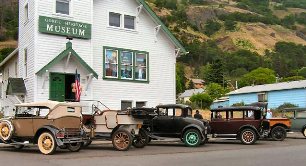Louisiana
Louisiana
Member ad 1

Fallon Young
South Summit Report envisions thriving Southern filmmaking community
Posted by Feb 26, 2019

Fallon Young
The American South is an expansive region, replete with storytellers and rich creative practices, and yet its stories are often misrepresented on-screen and in the media, contributing to reductive stereotypes that disempower our communities. When we look to contemporary art created by Southern artists across disciplines, we can see well beyond dominant narratives that depict a region marred by racial oppression and economic injustice. Artists often reveal what the media doesn’t––resilient communities that value cultural heritage and embrace progressive ideals, communities connecting across differences, fighting for social justice, and espousing an increasingly intersectional view of what it means to be Southern. What do these artists need to continue to tell bold and powerful stories, stories that have the potential to imagine new possibilities for a Southern identity––stories that have the power to reshape the nation’s understanding of our region, and to change how Southerners see ourselves?
Read More
Ms. Kim Bergeron
The Art of Gifting: Celebrating our culture with Shop Local Artists Week
Posted by Oct 05, 2018

Ms. Kim Bergeron
In cities and towns around the United States, people frequently are encouraged to “Shop Local” to support the many businesses that are such a critical part of their communities’ identities, with much of that focus targeted in November during “Small Business Week.” As of 2017 in Louisiana, the rally for support has been extended to the first full week of December, which is now an annual, statewide celebration known as Shop Local Artists Week (SLAW). We have a responsibility to ensure that our creative culture can continue to grow and flourish—especially since our state is among the most celebrated cultural destinations in the world. So another key focus is the development of partnerships between businesses and artists. Merchants throughout the parish are encouraged to consider adopting one or more local artists or authors during Shop Local Artists Week, and to consider hosting cultural events featuring those artists, including meet and greets, book signings and musical performances.
Read More
Randy Cohen
Americans Speak Out About the Arts in 2018: An In-Depth Look at Perceptions and Attitudes About the Arts in America
Posted by Sep 27, 2018

Randy Cohen
In a society struggling to find equity and social justice, Americans believe the arts improve the quality of our communities. How do we know? We asked. Americans Speak Out About the Arts in 2018 is the second in a series of national public opinion surveys conducted by Ipsos on behalf of Americans for the Arts. One of the largest ever conducted, it gauges the public perspective on (1) personal engagement in the arts as audience and creator, (2) support for arts education and government arts funding, (3) opinions on the personal and well-being benefits that come from engaging in the arts, and (4) how those personal benefits extend to the community. Here are some findings of the survey.
Read More
Ms. Christina Ritchie
Preparing Your Organization and Your Donors for Shifts in the Charitable Tax Deduction
Posted by Feb 16, 2018

Ms. Christina Ritchie
On January 1, the 2018 Tax Cuts & Jobs Act went into effect, a substantial change to the U.S. tax code which has the potential to negatively impact arts and culture nonprofit organizations in a variety of ways. One of the most significant impacts will come in changes related to the thresholds and amounts associated with the charitable tax deduction. This 100-year-old provision was designed to stimulate giving to charities and other organizations serving the public good by providing an opportunity to claim a deduction as a reduction in an individual’s tax burden. While the repercussions of the federal tax code changes are still emerging, and corresponding shifts in state-by-state tax policy may impact your situation, the notes that follow are an introductory primer. If you have questions about state-level implications, we recommend you reach out to your state comptroller or state association of nonprofits.
Read More
Ms. Kate O. McClanahan
Arts Advocacy Day Is Coming
Posted by Feb 01, 2018

Ms. Kate O. McClanahan
Although years may really just be a number, in its 31 years, Arts Advocacy Day has seen six different U.S. presidents spanning both political parties. It’s witnessed sixteen different congressional sessions and eight different Speakers of the U.S. House. Through it all, every year, attendees hear that “the arts are bipARTtisan.” Because, no matter who’s in office, arts advocacy matters. Funding decisions are made every year. Who’s deciding this year may not be deciding next year. Who’s to remember what happened before? Who’s to know why it matters? Who’s to learn from each other? The answer is us. All of us. All of us together.
Read More
Ashley Blakeney
Photographer and Pablove Shutterbug Cameron of New Orleans Drops #TruthBombs about Arts Education and Cancer
Posted by Sep 15, 2017

Ashley Blakeney
From my interview with 16-year-old student and Pablove Shutterbug Cameron Washington: “Photography came when I was going through a hard time in my life with cancer. When I started it, it brought me into a different world and into seeing different things with a deeper meaning. It helped me learn how to tell a story and say things without using words. It helped me see where I was in the world. I feel like art is really important because you can express a side of yourself that you normally wouldn’t feel comfortable sharing with strangers.”
Read More
Randy Cohen
Arts & Economic Prosperity 5: How the Nonprofit Arts & Culture Industry Impacts the Economy in Your Community
Posted by Jun 17, 2017

Randy Cohen
When recently asked how best to advocate for the arts in the current environment, U.S. Senator Tom Udall (NM)—co-chair of the Senate Cultural Caucus and chief sponsor of the CREATE Act—was unequivocal: “Start by telling every one of your Senators about the economic benefits of the arts.” This familiar refrain is one we have heard for decades from city council chambers to governor mansions to the halls of Congress—and it works. Arts & Economic Prosperity 5 does just that. It changes the conversation about the arts from that of a “charity” to one about an “industry” that provides both cultural and economic benefits to the community.
Read More
Ms. Kate O. McClanahan
Advocacy & Arts: Have You Seen the Ads?
Posted by May 05, 2017

Ms. Kate O. McClanahan
Elected leaders care deeply about the areas they represent and the views of their constituents who elect them every few years. They may not agree with what they think, but they do care to know what they think—and it is certainly one key factor that weighs on how they cast their votes, what issues they focus on, and what areas they deepen their knowledge. Since we know that ads bring attention to issues, inspire and educate the public, and mobilize grassroots, they are one great way to invite data and impact stories that can lead to policy change. And, we know that legislators read their local newspapers, so the message gets through.
Read More
Mr. Robert Lynch
Robert Lynch Responds to Hill Commentary Calling to End Funding for the NEA
Posted by Apr 24, 2017

Mr. Robert Lynch
In his op-ed (“The case for cutting National Endowment of the Arts funding,” April 2), David D’Amato states that “Government-funded art is publicly-funded art only once government is lazily conflated with the public. It is not the public (whatever indeed that may mean) that decides which art projects are to be supported with taxpayer dollars.” That statement is simply inaccurate. Mr. D’Amato must be unaware that the public is embedded in the entire grantmaking process at the NEA. This in part is why the NEA has received wide support from both Republicans and Democrats for half a century.
Read More
Randy Cohen
Top 10 Reasons to Support the Arts in 2017
Posted by Feb 14, 2017

Randy Cohen
As a young theater artist, I could always be counted on to step up and make a passionate plea when arts funding was on the line. I shared stories about myself and my colleagues with my legislators about how the arts are fundamental to our humanity. I wrote about how the arts ennoble and inspire us, fostering goodness and beauty. While I have never abandoned these arts-for-arts-sake messages in my advocacy, I have learned that they are rarely stand-alone winners. Today, I augment these fundamental benefits of the arts with pragmatic ones—stories and research that connect the arts to what keeps our community leaders awake at night: jobs, economy, education, healthcare, and community development. The change in my approach has made me a more effective advocate.
Read More
Jacques Rodrigue
Not Just Fluff: Blue Dog and Arts as Catalyst for School Improvement
Posted by Sep 14, 2016

Jacques Rodrigue
In 2009, my family formed the George Rodrigue Foundation of the Arts and as Executive Director I was tasked with trying to make sure the arts were kept in schools in a meaningful way. We believe that the arts are not just fluff, but that they are critical for student development in the 21st century.
Read More
Ms. Pam Korza
Tribute to Grace Lee Boggs
Posted by Nov 30, 2015

Ms. Pam Korza
Last month, our country lost one of its great thinkers and activists for a just and equitable society. We join friends and colleagues in Detroit and across the nation in mourning the loss of Grace Lee Boggs who passed away on October 5. She was and will live on as an unrelenting exemplar of what it means to live a life of humanity and activism in striving for social justice.
Read More
Stefanie Dickens
Public Art and Long-Term Value
Posted by Sep 22, 2015

Stefanie Dickens
CODAworx is a global, online community that is the first of its kind - serving as an artists' LinkedIn, made for the commissioned art world. We support public art because it is an investment that creates more significant, long-term value for the community.
CODAworx represents not only artists, but everyone collaborating on private and public art projects: architects, interior designers, fabricators, photographers… and most recently, building developers and a Rotary Club! Our passion at CODAworx lies in bringing the arts community together in one place, connecting them with the resources needed to create amazing art projects, and showcasing those projects to the world.
Read More
Mr. Jay H. Dick
Lt. Governors Endorse Arts Education Week
Posted by May 05, 2015

Mr. Jay H. Dick
For eight years now, Americans for the Arts has partnered with our nation’s Lieutenant Governors to promote arts education and other arts-related issues. I am often asked, “Jay, why do we work with the Lt. Governors?” The answer is simple. Whether they are elected directly, or on a ticket, Lt. Governors have broad portfolios including many aspects of tourism, creative economy, education, and economic development. Secondly, almost half of them go on to become their state’s next governor.
Read More
Ms. Kerry Adams Hapner
Taking Notes: USUAF Convenes in NOLA
Posted by Apr 10, 2015

Ms. Kerry Adams Hapner
In January, the United States Urban Arts Federation (USUAF) held its winter meeting in New Orleans (NOLA). A program of Americans for the Arts, USUAF is comprised of executive leaders of the local art agencies (LAA) in the 60 largest cities in the United States. USUAF serves as a forum to have a peer-to-peer knowledge exchange around best practices and contemporary issues facing LAAs in their respective communities. We learn from each other, and meeting locations serve as case studies that demonstrate the unique role that the arts and LAAs serve in urban life.
Read More
Mr. Jeff M. Poulin
Arts Education: Ten Things to Remember from 2014
Posted by Jan 09, 2015

Mr. Jeff M. Poulin
I can now affirmatively say that I have been at Americans for the Arts for over a year! Woohoo! …And what a year it has been.
Each month the Arts Education Advisory Council of Americans for the Arts has a monthly call. In December, we sat on the call reflecting on the previous year and what we had all accomplished personally, collectively, and throughout the field. In my role as the Arts Education Program Coordinator, I am privileged to see a lot of things that happen on a national scale across the country, and the council often provides insight into the impacts of these trends or brings my attention to something that is up-and-coming before it has actually made a splash.
Read More
Nato Thompson
The Aesthetics of Politics, Art, and Communications
Posted by Nov 18, 2014

Nato Thompson
 Nato Thompson
Nato Thompson
When we begin to wrap our heads around the fact that culture-making surrounds us on a daily basis, and that everyday people are now both consumers and producers of symbolic production, we can then more accurately approach the question of aesthetics and politics, and begin to see how it operates around us daily.
The question of aesthetics and politics is certainly not new. It has been both a productive and destructive line of inquiry throughout much of the 20th century, much debated between Bertolt Brecht and Theodore Adorno, and the Constructivists and social realists of the Russian Revolution. It sat at the heart of the Harlem Renaissance, was rife throughout 2nd wave feminism, was a central concern of the Zapatistas revolution, and was prominent in so many other social movements. It is a question that is as clumsy as it is urgent. It is neither new nor resolved.
This is all to say: if the topic of aesthetics and politics gives you a headache, find odd comfort knowing that you are not historically alone.
Read More
Emma Leggat
Investing in the Artists and Fans of Tomorrow: StubHub’s Story
Posted by Oct 20, 2014

Emma Leggat
 Emma Leggat
Emma Leggat
I have the pleasure of serving as StubHub’s Head of Corporate Social Responsibility (CSR) and in September 2012, had a life-changing opportunity to visit New Orleans with a special mission.
New Orleans was to host Super Bowl XLVIII, meaning it would also be the site of StubHub’s annual Super Bowl Pregame Bash, which attracts some 7,000 attendees each year. The city of New Orleans has given so much to sports and music fans alike, and as the world’s largest ticket marketplace, these very fans are the core of our business. Naturally, we wanted to give back.
While considering ways to narrow StubHub’s CSR focus to increase our positive impact, we uncovered findings any Americans for the Arts member knows all too well: while more research than ever before demonstrates how vital the arts are to youth development and future achievement, budget cuts continue to threaten arts education in schools across the country, particularly those in underserved communities. These findings further spurred our drive to give back.
Read More
Stehpanie Sherman

Abigail Satinsky
Common Field -- Where Arts Organizers Convene, Exchange, Vision
Posted by Sep 05, 2014

Stehpanie Sherman

Abigail Satinsky
Arts organizers face a unique set of problems, probably similar to that of a circus ringleader. You need diplomacy, imagination, creativity, flexibility. You also have to be incredibly practical - managing budgets, funders, logistics. You’re often working with volunteers and supporters who need to receive non-economic benefits and feel engaged and excited. Communication is key.
First, what is “the field” we’re talking about? Artist-run spaces, experimental venues, artists creating platforms and opportunities for other artists, and organizations that put supporting artists’ work at the heart and center of their mission. We operate across a wide range of organizing principles - from being a 501(c)3 organization to a co-operative or collective, from long-running institutions to short-term projects - but we all struggle with a similar set of questions. Why is supporting experimental visual art practice important? Who are our audiences and partners? What are our tactics and strategies? What does sustainability look like? How can articulate more broadly the values and impacts emerging from this work?
Read More
Ms. Ayanna Hudson
A New Vision for Arts Education
Posted by May 28, 2014

Ms. Ayanna Hudson
The Arts Endowment’s vision is that every student is engaged and empowered through an excellent arts education. This statement reflects a fundamental belief that all students should have the opportunity to participate in the arts, both in school and out of school. It also acknowledges the very real benefits of an arts education—students participating in the arts are engaged in life and are empowered to be fulfilled, responsible citizens who make a profound, positive impact on this world. I'd like to share with you what the NEA has learned about how to achieve this vision and steps we are taking to move this vision forward.
Read More
Kiyoko McCrae
The History and Importance of Oral Documentation and Storytelling
Posted by May 13, 2014

Kiyoko McCrae
Junebug Productions’ work has always revolved around storytelling. It has been built on stories and its practices continue to be passed on through a strong oral tradition. The story circle process was created by members of Free Southern Theater (FST), Junebug’s predecessor, as a way to better engage with audiences following performances. The process was further refined by Junebug Productions and subsequently through its collaboration with Roadside Theater.
John O’Neal, co-founder of FST and founding Artistic Director of Junebug Productions has centered his work on stories because, as he states, “people come to shared understanding more quickly” through “stories and working with metaphor rather than argument.” You can’t argue with someone’s experience. You may not like what you hear but you can’t disagree with someone’s personal truth. Stories demand respect in a way that arguments never can. The story circle teaches us many important values such as listening, respect, and empathy that are necessary in democratic process. However, the form of storytelling teaches us even more. There are values and skills that are particular to the oral tradition that cannot be learned through writing.
Read More
Randy Cohen
Top 10 Reasons to Support the Arts in 2014
Posted by Mar 20, 2014

Randy Cohen
There is an old quote attributed to John Montagu, 4th Earl of Sandwich:
“If any man will draw up his case, and put his name at the foot of the first page, I will give him an immediate reply. Where he compels me to turn over the sheet, he must wait my leisure.”
This was the charge given to me by a business leader who needed to make a compelling case for government and corporate arts funding:
“Keep it to one page, please,” was his request. “I can get anyone to read one page.”
With the 2014 arts advocacy season upon us, the following is my updated “Top 10 Reasons to Support the Arts.”
Read More
Lindsay Sheridan
Placemarking: Public Art and Emergency Preparedness
Posted by Jul 19, 2013

Lindsay Sheridan
Doug Kornfeld knew he won the gig the moment someone mentioned Mardi Gras. He had just presented to the jury for New Orleans’ public art City-Assisted Evacuation marking project – dubbed “Evacuspots” – with his proposal for 14-foot-high, 850 lb stainless steel stick figures with one arm reached out in the universal sign for “I need a ride!” But what Doug, an artist based in Boston, MA, hadn’t counted on was that his design would have a perfectly iconic Big Easy connection: that of someone gesturing to have beads thrown at them on Mardi Gras.
This festive figure has a serious task, though. It’s part of a new solution for hurricane evacuation developed by the nonprofit philanthropy organization Evacuteer.org in the wake of the 2005 disaster Hurricane Katrina, which left more than 100,000 residents stranded in the city with no means of escape. Through an agreement with the City of New Orleans, Evacuteer.org recruits, trains, and manages evacuation volunteers – dubbed evacuteers – to run a system that is capable of picking up and transporting 30,000 residents to state-run shelters in the event of a necessary evacuation. The system was tested once in September 2008 in advance of Hurricane Gustav. While about 18,000 residents utilized the City-Assisted Evacuation Plan, many residents had little idea of where the pickup points were since they were marked by small, unnoticeable placards with a lot of text. So Robert Fogarty, co-founder and board president of Evacuteer.org, brought up a new idea: what better way to draw attention to the spots than with a public art piece?
Read More
Mr. Jay H. Dick
Honoring John Legend, The Roots & Arts Leaders from Maryland, Louisiana, and New Mexico
Posted by Jan 31, 2013

Mr. Jay H. Dick
 John Legend received a Citizen Artist Award from The United States Conference of Mayors and Americans for the Arts. Also pictured are Philadelphia Mayor Micheal Nutter (left), New Orleans Mayor Mitch Landrieu, and Maryland Gov. Martin O'Malley. (Photo via USCM)
John Legend received a Citizen Artist Award from The United States Conference of Mayors and Americans for the Arts. Also pictured are Philadelphia Mayor Micheal Nutter (left), New Orleans Mayor Mitch Landrieu, and Maryland Gov. Martin O'Malley. (Photo via USCM)
Each year, Americans for the Arts presents a series of Public Leadership in the Arts Awards to elected officials at all levels of government and artists who speak out in favor of the arts and arts education.
We just recently presented the first of the 2013 awards at The United States Conference of Mayors (USCM) Winter Meeting in Washington, DC. The USCM is Americans for the Arts' oldest public partnership going back more than two decades.
Each year, we also sponsor the “Mayor’s Arts Breakfast” were we present awards to two mayors, a governor, and one or more nationally-acclaimed artists. This event is very important as more than 350 of the country’s most powerful mayors gather to hear about how the arts are important to their cities.
I am happy to report that over the years, our nation’s mayors have become vocal advocates for arts funding as we provide them with a front row seat to learn the importance of arts and culture and the economic value the sector provides.
At this year's breakfast, New Orleans Mayor Mitch Landrieu and Santa Fe Mayor David Coss were recognized for their support of the arts and culture in their cities. Both of these mayors, one from a fairly large city and the other of a fairly modest size, understand the importance and value of supporting their local nonprofit arts community and how that support generates substantial economic impact.
Read More
Judi Jennings
Questions to Ask Before Addressing Scale
Posted by Dec 05, 2012

Judi Jennings
 Judi Jennings
Judi Jennings
Does size matter? Of course it does. But is this the right question to ask first?
How about approaching the question of size by first asking how arts, culture, and philanthropy advance positive social change? And how does size relate to equity?
Size matters locally and globally, but arts and culture drive change regardless of the size. Maria Rosario Jackson’s recent report on Developing Artist-Driven Spaces in Marginalized Communities convincingly argues that arts and culture create community identity, stimulate civic engagement, and affect neighborhood economies directly and indirectly.
Writer and cultural organizer Jeff Chang argues that “where culture leads, politics will follow” on national and international issues.
As a place-based grantmaker, my theory of change is that local people make the most appropriate and lasting advancements when they have the necessary tools and resources.
Allied Media Projects (AMP) in Detroit is a great example of place-based social change. AMP argues that “place is important” and “Detroit is a source of innovative, collaborative, low-resource solutions."
Honoring local culture does not mean working in isolation. MicroFest USA, for example, led by the Network of Ensemble Theatres, is looking at how art and culture can create healthy communities in Detroit, Appalachia, New Orleans, and Hawaii. The idea is that performance-based learning exchanges like this can connect artists, activists, cultural workers, and thinkers working locally and nationally.
Read More
Ms. Nina Z. Ozlu Tunceli
The Intersection of Creativity & Commerce Gives Us the Cultural Economy (from Arts Watch)
Posted by May 09, 2012

Ms. Nina Z. Ozlu Tunceli
Culture equals jobs. This was the theme of the 2012 World Cultural Economic Forum hosted by New Orleans Mayor Mitch Landrieu, who is one of the most enlightened and empowered elected leaders that this nation has ever seen regarding strategically investing in his city’s cultural economy in order to move it forward.
As chief counsel of government and public affairs at Americans for the Arts, I can’t begin to tell you how refreshing it was to be at a two-day conference filled with elected officials and diplomats from around the world, focused exclusively on how these leaders are incorporating public policies to showcase the arts and culture for both its social and economic powers.
Mayor Landrieu did an amazing job of showcasing New Orleans’ investment in arts education to develop the next generation of culture workers; its investment in building local film and recording studios, performance centers, and clubs to attract current culture workers; its investment in tax credits for both film production and post-production editing, marketing, gaming, and software to attract culture businesses; and its investment in tourism marketing and branding initiatives, such as JazzFest, to attract out-of-town visitors, especially from abroad, in order to grower larger audiences for its cultural industries. You can catch up on more news about the forum on Twitter by searching #WCEF.
Below is an excerpt of Mayor Landrieu’s opening address at the 2012 World Cultural Economic Forum:
“Recently, the world has seen dramatic changes in political, social, and cultural landscapes. These changes have been fueled not only by political and economic factors, but also by social and cultural issues.
Read More
Theresa Cameron
Getting the Pulse: The Local Arts Agency Listening Post Part II
Posted by Apr 22, 2011

Theresa Cameron
As part of the Local Arts Agency Listening Post we asked if folks had additional comments beyond the specific questions in the survey, and several members took us up on it.
I had the opportunity to speak with Leigh Anne Chambers, the Executive Director of the North Central Louisiana Arts Council in Ruston, LA.
The North Central Louisiana Arts Council serves the five parishes of Lincoln, Bienville, Claiborne, Jackson, and Union - one of Louisiana’s poorest regions.
The council used to receive funds from two separate grants from the state, but now they receive about half of that. They filled in the gaps with fundraising and memberships but they are still haven’t made up for the loss of the state monies.
Read More









